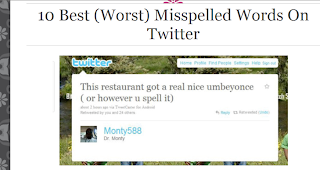 After reading both articles I do think the people
researching the topic do bring up good points. I am able to see poor grammar
daily on all social media sites and through my conversations with others.
Although I can see this form of writing everyday I don’t think it shows peoples
literacy skills to the best of their abilities. Like they explain in the
article people who are expressing themselves places other than a controlled
classroom setting do use different forms of writing. Online due to me feeling
free about what I am writing and who can read it, I am able to use more relaxed
grammar and don’t have to worry about being as harshly critiqued on my literacy
skills. I do think when they talk about the revolution taking place in present
day they are stating a very valid point. Compared to just ten years ago the
Internet and all technology have changed drastically and the way we are now
using it has to. Due to more people using cell phones and computers, from young
children to people in there 90’s the range of people effected by the content on
these devices is growing.
After reading both articles I do think the people
researching the topic do bring up good points. I am able to see poor grammar
daily on all social media sites and through my conversations with others.
Although I can see this form of writing everyday I don’t think it shows peoples
literacy skills to the best of their abilities. Like they explain in the
article people who are expressing themselves places other than a controlled
classroom setting do use different forms of writing. Online due to me feeling
free about what I am writing and who can read it, I am able to use more relaxed
grammar and don’t have to worry about being as harshly critiqued on my literacy
skills. I do think when they talk about the revolution taking place in present
day they are stating a very valid point. Compared to just ten years ago the
Internet and all technology have changed drastically and the way we are now
using it has to. Due to more people using cell phones and computers, from young
children to people in there 90’s the range of people effected by the content on
these devices is growing.
In my own experiences online I have encountered individuals
who show exception writing skills where format and grammar aren’t very much
appreciated. I do find that even while texting I more than other use proper
grammar and punctuation. Many people I talk to do not use grammar properly and
I do find that sometimes what they are trying to get across sometimes becomes
lost, due to improper grammar. I think using proper grammar is important
because it shows professionalism and makes communicating much easier but I also
think that people who do not use proper grammar are doing anything wrong. I
think it is a choice to use such grammar especially by those who are educated
enough to have the ability to use proper sentence structure and punctuation,
and that choice should be left to the individual to make.










